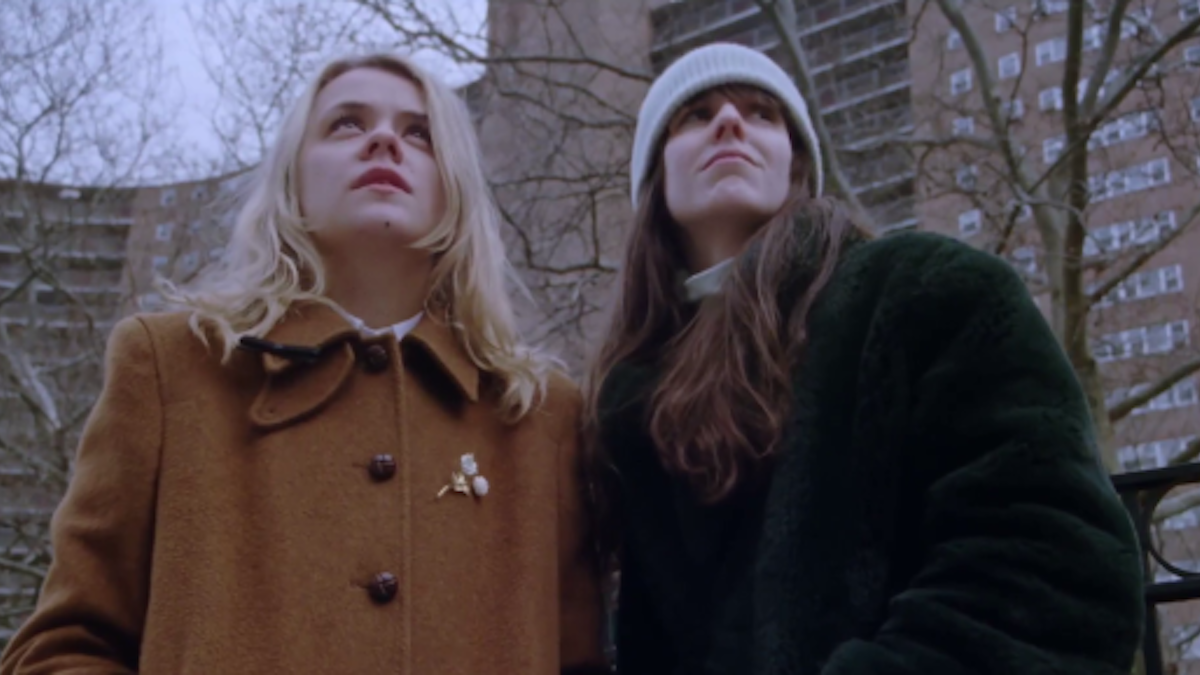
If you tune in to Dasha Nekrasova’s podcast Red Scare, you’ll be met with a millennial cocktail of vocal fry, cigarette puffs, and deadpanned cultural commentary. Whether with a self-constructed shield of irony or in earnest, Nekrasova and co-host Anna Khachiyan share a penchant for entertaining ideas not typically to the taste of the political “left”, all while frequently lamenting an oft-targeted neoliberal American cultural ethos. With her first full length feature, 2021’s The Scary of Sixty First, Nekrasova exchanges the mic for the camera, yet keeps the criticism directed towards the elite and those with an acidic grip on the culture.
There are a few angles one can take with Nekrasova’s directorial debut; we have, of course, the lens of pure, unadulterated horror camp, sans the trappings of any larger, societal criticism. But in viewing the film as such, we would be missing the very clear thesis of the film, that there are larger, phantomic structures in place which control our collective focus. It’s easy to forget this when viewing the film; its tone does not necessarily lend itself to serious film criticism. Just a cursory glance at some online reviews will tell you this. However, given that the shadow of Jeffrey Epstein lingers over the film and not some nameless ghouls, clearly Nekrasova’s “scary” is the haunting of the main characters as they dare to penetrate the fetid miasma which circulates our culture. But if one were to occupy themselves solely with the aesthetics, with the surface of the film – the plot, the camp, the clunky dialogue – and dismiss the work altogether as poor, they themselves are turning away, either consciously or not, from the stark and disturbing realities in which the global elites attempt (rather successfully) to distract us from. In this respect, one can view the viewing itself of the film as a metacommentary on the ability to conceive of true terror – those aforementioned larger phantom puppeteers, the same ones who stop short any further venture towards the truth. Perhaps, then, the aesthetics of the film serve this purpose of reminding the audience to really look behind the curtain. To not fall victim to the distractions.
The film does an adept job, too, at creating an overall tone of isolation and emptiness. This can, in part, be attributed to the film’s low budget, using the few sets and small cast to reinforce the insularity the characters feel; rarely do the main characters interact with anyone beside themselves. Frequent camera pans to the cold, brutal buildings of Manhattan and the synth heavy soundtrack by Eli Kessler add to this hypnotic, solitary quality.
Noelle (played by co-writer Madeline Quinn) is the impressionable innocent. So it comes as no real shock when she is immediately engulfed in her mysterious new friend’s (Nekrasova) amphetamine-fueled paranoia and quest for answers regarding the Epstein pedophile ring. Clearly, her character is intended to parallel those who obsess themselves with conspiracies without fully knowing what it is they are even obsessed with. Noelle’s fast falling for the nameless woman and her eccentricities are easy targets of the audience’s derision. After all, how could someone become so enamored in anything – let alone a heady, thumb-tack and yarn fascination like the Epstein situation – that quickly? But as the movie concludes, and we realize that the woman was right, that there is a larger conspiracy at play, we come to learn that kernels of truth may lie even among those whom we feel are so different from ourselves. We distance ourselves from those whose ideologies differ, or those ideologies which we cannot understand, labeling them crazy, conspiratorial, dangerous. Nekrasova implores us to see past the surface.
Greg, Addie’s detached boyfriend, is seen playing a dating sim game while Addie lies in bed with him. He pays no mind to her at all. This, of course, is another distraction. Instead of interacting with his very real, affectionate girlfriend, he concerns himself with something unreal. Have the powers that be even infiltrated our conception of reality?
At one point Noelle and “the Girl” enter a crystal shop, looking for advice from an expert on a mysterious card found in Noelle’s and Addie’s apartment. The owner, already cold and cagey, becomes increasingly antagonistic towards them as he realizes the card’s dark energies. He hurries them out with a crystal, but obviously wants nothing to do with the darkness. It’s everyone for themselves.
It is clear, then, that Scary interprets our isolation as a convenient, likely intentional tool of those who want to distract us. In presenting us with the effects of this isolation, Nekrasova perhaps prescribes the “solution”, or the answer: shed the individualist ethos so pervasive in late stage capitalism and band together to demand and search for the truth. If we continue on this trajectory and become even more isolated from each other, the grip only tightens, and even worse crimes may be committed against humanity.

